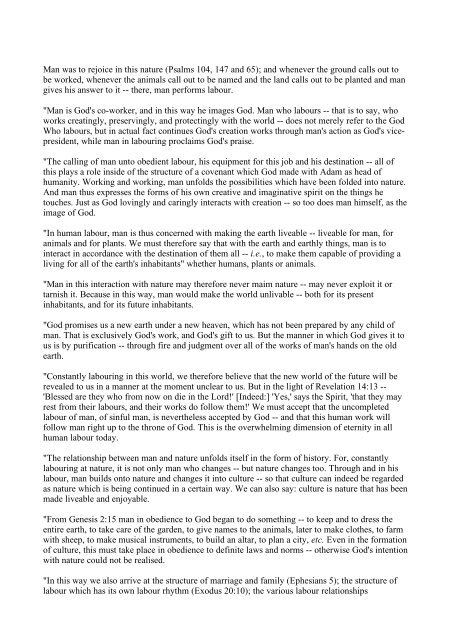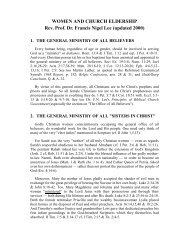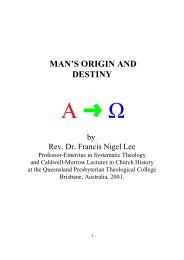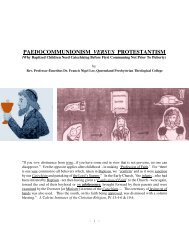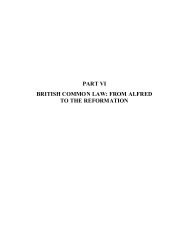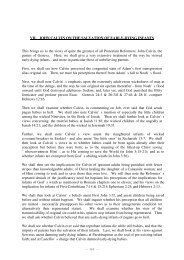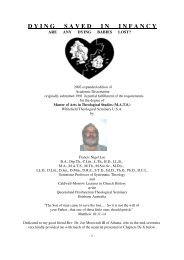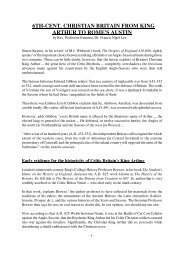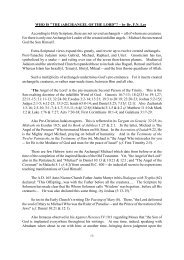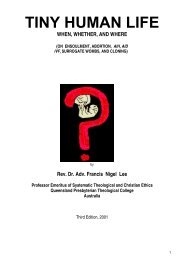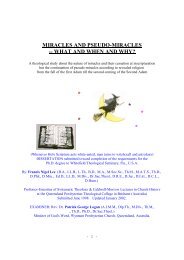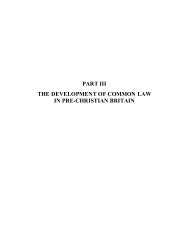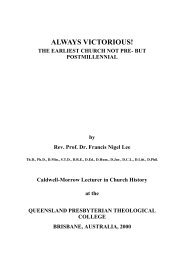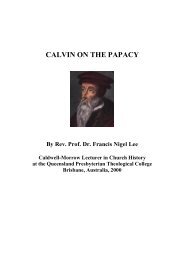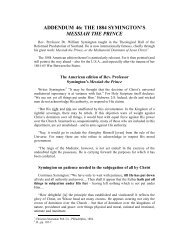Eight: Influential Afrikaner Thinkers since the 'SixtiesWe have now reached 1960/61. Here we wish to spend this lecture in looking at the eschatology <strong>of</strong>victory in the Afrikaner thought <strong>of</strong> some very brilliant and relatively young Afrikaner thinkers --Johan Heyns, Danie Strauss, Adrio König, Errol Hulse and Cornelius van der Waal.Pr<strong>of</strong>essor Johan Heyns started preaching and teaching at an early age. He was born on a farm. As alittle boy, he would scoop together empty cobs <strong>of</strong> corn (after the corn had been eaten <strong>of</strong>f), and buildhimself a pulpit. He would assemble around him the little Black boys <strong>of</strong> men working on the farmand get them to listen to his expositions.Since then, he has never looked back. When he grew up, he went to Potchefstroom University forChristian Higher Education. <strong>The</strong>re he majored in philosophy under Pr<strong>of</strong>essor Hendrik Stoker who-- says Heyns -- "left an ineradicable stamp on my whole thought and outlook." We will see that,when I give you a few quotations from the work <strong>of</strong> Heyns a little later on.Heyns then proceeded in 1949 to the University <strong>of</strong> Pretoria. <strong>The</strong>re he took his B.D. (Bachelor <strong>of</strong>Divinity), and his M.A. in Philosophy -- both <strong>of</strong> them cum laude (with honours). That is verydifficult to achieve in South Africa, by the way. <strong>The</strong>n he went to the Free University <strong>of</strong>Amsterdam, where he took his theological Doctor's Degree under Pr<strong>of</strong>essor Berkouwer with adissertation on the modalistic or Sabellian doctrine <strong>of</strong> the Trinity with specific reference to KarlBarth.After that, he undertook a further Doctor's Degree in the area <strong>of</strong> anthropology under Stoker.Berkouwer sent Heyns to Barth in Switzerland. In Basel, he attended lectures at the feet <strong>of</strong> KarlBarth (about whom he later wrote a book). Heyns also had the privilege <strong>of</strong> studying at the feet <strong>of</strong>the great Existentialist Philosopher Karl Jaspers.Heyns has written much. Some <strong>of</strong> his publications include: the doctoral dissertation on <strong>The</strong> BasicStructure <strong>of</strong> the Modalistic View <strong>of</strong> the Trinity. <strong>The</strong>n there is also his work on anthropology, IsChristianity Dying? Also: <strong>The</strong>ology in the Grip <strong>of</strong> the Spirit <strong>of</strong> the Times; <strong>The</strong> Bridge Between Godand Man; <strong>The</strong> Church; Karl Barth, Who Is He and What He Wants; Systematic <strong>The</strong>ology; <strong>The</strong>Millennial Idea (a critique <strong>of</strong> premillennialism); and his long and very important essay on <strong>The</strong><strong>The</strong>ology <strong>of</strong> Obedience.<strong>The</strong> last mentioned work was at the time somewhat criticised by Pr<strong>of</strong>. Norman Shepherd <strong>of</strong>Westminster <strong>The</strong>ological Seminary in Philadelphia. But I believe, since then, Shepherd himself hasreached a position that would be in almost complete agreement with what Heyns then wrote in thatwork some ten or twelve years ago. This can also be seen from Heyn's ethical work on theexposition <strong>of</strong> the Law <strong>of</strong> God entitled <strong>The</strong> New Man Underway.Here are some very interesting quotations from Heyns's work on systematic theology that I believeyou will enjoy. He points out that man must exist in relationship not only to God but also to nature."Being a man, means being in the world. Man and world belong together. <strong>The</strong>y are directed towardone another, intended for one another, and cordially interwoven with one another in a whole host <strong>of</strong>ways. For his existence, man is dependent upon nature, and for its transformation, nature isdependent upon man. Man, himself part <strong>of</strong> the nature around him, received the words from God:'subjugate it, work at it and guard it and keep it.'"To the animals, man was to give names, and plants and seeds <strong>of</strong> trees and fruit were to be his food.
Man was to rejoice in this nature (Psalms 104, 147 and 65); and whenever the ground calls out tobe worked, whenever the animals call out to be named and the land calls out to be planted and mangives his answer to it -- there, man performs labour."Man is God's co-worker, and in this way he images God. Man who labours -- that is to say, whoworks creatingly, preservingly, and protectingly with the world -- does not merely refer to the GodWho labours, but in actual fact continues God's creation works through man's action as God's vicepresident,while man in labouring proclaims God's praise."<strong>The</strong> calling <strong>of</strong> man unto obedient labour, his equipment for this job and his destination -- all <strong>of</strong>this plays a role inside <strong>of</strong> the structure <strong>of</strong> a covenant which God made with Adam as head <strong>of</strong>humanity. Working and working, man unfolds the possibilities which have been folded into nature.And man thus expresses the forms <strong>of</strong> his own creative and imaginative spirit on the things hetouches. Just as God lovingly and caringly interacts with creation -- so too does man himself, as theimage <strong>of</strong> God."In human labour, man is thus concerned with making the earth liveable -- liveable for man, foranimals and for plants. We must therefore say that with the earth and earthly things, man is tointeract in accordance with the destination <strong>of</strong> them all -- i.e., to make them capable <strong>of</strong> providing aliving for all <strong>of</strong> the earth's inhabitants" whether humans, plants or animals."Man in this interaction with nature may therefore never maim nature -- may never exploit it ortarnish it. Because in this way, man would make the world unlivable -- both for its presentinhabitants, and for its future inhabitants."God promises us a new earth under a new heaven, which has not been prepared by any child <strong>of</strong>man. That is exclusively God's work, and God's gift to us. But the manner in which God gives it tous is by purification -- through fire and judgment over all <strong>of</strong> the works <strong>of</strong> man's hands on the oldearth."Constantly labouring in this world, we therefore believe that the new world <strong>of</strong> the future will berevealed to us in a manner at the moment unclear to us. But in the light <strong>of</strong> Revelation 14:13 --'Blessed are they who from now on die in the Lord!' [Indeed:] 'Yes,' says the Spirit, 'that they mayrest from their labours, and their works do follow them!' We must accept that the uncompletedlabour <strong>of</strong> man, <strong>of</strong> sinful man, is nevertheless accepted by God -- and that this human work willfollow man right up to the throne <strong>of</strong> God. This is the overwhelming dimension <strong>of</strong> eternity in allhuman labour today."<strong>The</strong> relationship between man and nature unfolds itself in the form <strong>of</strong> history. For, constantlylabouring at nature, it is not only man who changes -- but nature changes too. Through and in hislabour, man builds onto nature and changes it into culture -- so that culture can indeed be regardedas nature which is being continued in a certain way. We can also say: culture is nature that has beenmade liveable and enjoyable."From Genesis 2:15 man in obedience to God began to do something -- to keep and to dress theentire earth, to take care <strong>of</strong> the garden, to give names to the animals, later to make clothes, to farmwith sheep, to make musical instruments, to build an altar, to plan a city, etc. Even in the formation<strong>of</strong> culture, this must take place in obedience to definite laws and norms -- otherwise God's intentionwith nature could not be realised."In this way we also arrive at the structure <strong>of</strong> marriage and family (Ephesians 5); the structure <strong>of</strong>labour which has its own labour rhythm (Exodus 20:10); the various labour relationships
- Page 1 and 2:
THE CHRISTIAN AFRIKANERSA Brief His
- Page 3 and 4:
God richly bless the following lect
- Page 5 and 6:
There have always been, and always
- Page 7 and 8:
But the only one they both appeal t
- Page 9 and 10:
Now Zuidema was a very great Dutch
- Page 11 and 12:
Dutch churches at the Synod of Dord
- Page 13 and 14:
station -- to help the Dutch ships
- Page 15 and 16:
It is a country dedicated to freedo
- Page 17 and 18:
1760 -- there was more and more dis
- Page 19 and 20:
with the Dutch. Many moved farther
- Page 21 and 22:
said: "The British have placed our
- Page 23 and 24:
financed by White money. It is buil
- Page 25 and 26:
Famous Boer Generals, left to right
- Page 27 and 28:
Three: Unannihilated: the Resurrect
- Page 29 and 30:
(who had arrived in the country onl
- Page 31 and 32:
of success.I may add that White Sou
- Page 33 and 34: General Beyers felt that those text
- Page 35 and 36: Balfour Declaration. The gist of it
- Page 37 and 38: Africa; treks on into the land both
- Page 39 and 40: Four: The Eschatology of Victory in
- Page 41 and 42: ide -- to use the instrumentality o
- Page 43 and 44: Christian National Calvinist Public
- Page 45 and 46: through constitutional process it h
- Page 47 and 48: I guess the best way to describe Sm
- Page 49 and 50: He was followed after his assassina
- Page 51 and 52: So the Scots came. I am going to sp
- Page 53 and 54: the Reformed Church in South Africa
- Page 55 and 56: ook on Hebrews. But his greatest wr
- Page 57 and 58: At that point, Du Plessis enquired
- Page 59 and 60: Yet quite apart from this high view
- Page 61 and 62: One last point. There is a tremendo
- Page 63 and 64: African Republic in 1902, the Cape
- Page 65 and 66: One of the most important Calvinist
- Page 67 and 68: Pellissier, who wrote on music and
- Page 69 and 70: perspective -- even while he minist
- Page 71 and 72: ever encountered by the Whites in S
- Page 73 and 74: Now the United States does not need
- Page 75 and 76: majority of the White citizens are
- Page 77 and 78: Now you will not find in any of Sto
- Page 79 and 80: Finally, Stoker argues that the so-
- Page 81 and 82: This then brings Stoker to another
- Page 83: This Brummer just referred to, is a
- Page 87 and 88: enhanced. For, in the present, man
- Page 89 and 90: he declared, riddled with the ungod
- Page 91 and 92: Van der Waal is a very brilliant So
- Page 93 and 94: World War II when he was hiding fro
- Page 95 and 96: The Professor of Philosophy -- or I
- Page 97 and 98: glory.There are also Christian psyc
- Page 99 and 100: Then there are Christian criminolog
- Page 101 and 102: Massachusetts at Gordon- Conwell fo
- Page 103 and 104: well known -- is being pioneered in
- Page 105 and 106: people in South Africa. The South A
- Page 107 and 108: nature and of human culture (Prover
- Page 109 and 110: The parousia of Jesus Christ will i
- Page 111 and 112: more and more christianised. Later
- Page 113: END


